Chuck E. Weiss rolled the dice (1945-2021)
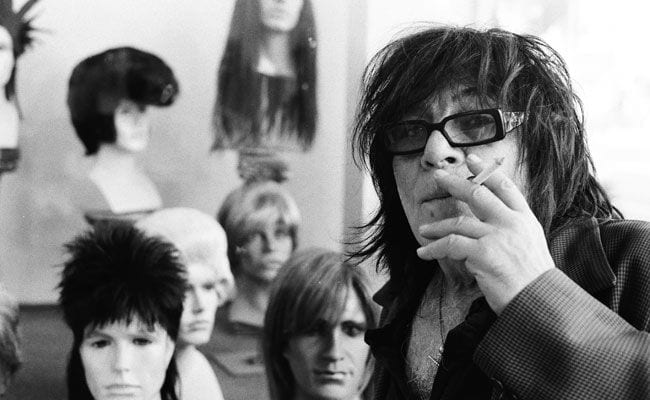
Chuck E. Weiss (Image via ANTI- records)
Singer-raconteur Chuck E. Weiss lived in a world of flickering neon where every ashtray was filled and sunset hearts wandered on the edges of empty. Weiss was popularized in the 1979 Rickie Lee Jones hit “Chuck E’s in Love” but I came to know him in 1987 when he was headlining Chuck E. Weiss and the Godddam Liars, an industrial-strength rock n’ soul revue at The Central in West Hollywood, Ca.
Chuck Edward Weiss died on July 20 after a battle with cancer. He was 76 years old.
Exit numbers: 7/20/21. Sounds lucky.
Once in a while, the Chicago Sun-Times would send me on road trips with the condition of packaging more than one profile in my journey. Finding Weiss may have been the same trip where I interviewed a strung-out Ike Turner in the lobby Holiday Inn in Hollywood. I can’t remember. But I can remember Weiss’s set at The Central.
The Liars were drenched in pure rock n’ roll and rhythm and blues. Their covers included Louis Jordan’s “Saturday Night Fish Fry” and Art Neville’s “Zing Zing.” Weiss sang in gruff tones and was flanked by his saxophonist Spyder Mittleman. They sometimes performed in bathrobes, which reminded me of seeing Marvin Gaye in a bathrobe in 1983 at the Holiday Star Theater in Merrillville, Ind.
Spyder led Weiss on stage through a sea of sweaty fans. Weiss leaned on Spyder’s shoulder, kind of like the Springsteen-Clarence Clemons thing. Weiss had a tightly cropped Prince Valiant haircut as he took the audience on a gripping adventure through American roots music.
The Liars were an all-star aggregation of L.A. players. Lead guitarist Tony Gilkyson was with Lone Justice and had been playing with X. Piano player Michael Murphy was the lead singer for R.E.O. Speedwagon between 1973 and 1976. Bassist Will McGregor and drummer Don Heffington played with Lone Justice and Emmylou Harris. The musicians’ other obligations explain why the Liars held court every Monday night before a full house at The Central.
The Central was a dive bar where John Belushi fathered the Blues Brothers and the Who’s John Entwistle was seen in the Tuesday night open jam, circa 1981. Weiss has been credited for keeping The Central afloat until actor Johnny Depp bought it in 1993 and renamed it the Viper Room.

Chuck E. Weiss courting the Ace of Spades during The Central years.
Despite the adoring fans and his post-modern Cab Calloway flairs, Weiss thought he was neglected in Los Angeles. “Not only do we not have an album, but this is the first interview I’ve done in four years,” Weiss admitted during a conversation at the bleak Dunes Motel Lounge on Sunset Boulevard.
“For the most part, we’re ignored. We have one of the largest followings in L.A. I think we do multi-dimensional music (that also incorporated zydeco and dirge jazz) and we can’t even get a review in the newspaper. A lot of people have a stigma about local bands being ‘bar bands.’ Robert Hilburn (of the Los Angeles Times) has labeled us a ‘bar band,’ but he won’t come out and see us. In a way, you’re jeopardized by working in town. You get labeled.
“We’re a cheap date and a good time.”
Weiss flew in the same smoky orbit of Tom Waits, with bit roles in material such as Waits’ epic “Nighthawk Postcards (From Easy Street),” recorded in 1975 before a small audience at the Record Plant in Los Angeles.
Weiss enjoyed talking about Chicago. He said that in late 1975 he was a neighbor of Waits for a brief period at the Wilmont Hotel, an SRO on Belmont during the heyday of the Quiet Knight, 953 W. Belmont. “I was writing songs for Waits there,” he claimed. “I was staying there out of necessity, but Waits was staying there because he wanted to get his elbows dirty and hang out with the nitty-gritty. That was a fun place.
“Another guy I hung with in Chicago was Johnny Barnette, a country porn singer. (Not the late Nashville songwriter Jonnie Barnett.) He did sick humor songs and parodies of country music. He had this Hank Williams bit where he was the chauffeur of the limo of Hank’s last ride. He’s talking to Hank, but he doesn’t realize Hank’s dead. He was just one of the characters I used to hang around with.”
Drug use is why Weiss never returned to Chicago. “I was strung out on pills and hard narcotics,” he said. “I could never go anywhere. I decided to get sober in 1982. And in that time I haven’t gone anywhere. I went to a lot of places loaded, but I can’t really say I was there. I’d take it to the wall. There were some things I liked about myself but there were many things I didn’t like about myself. I wanted to see what it was like to be myself. That’s why I became sober. I wasn’t afraid to die. I was afraid to go nuts. But I’m not a born-again Jew or anything like that.” His compatriot, Spyder Mittleman died of a drug overdose in 2000 at the age of 47.
Here’s Weiss and Spyder courtesy of our friend Art Fein (whose Poker Party also appears in our “Center of Nowhere” documentary on the Springfield, Mo. music scene):
Weiss was born in Chicago although he also said he was from Denver, Co. where his parents ran a downtown record store. He began performing at a Denver supper club. In 1972 Weiss met Waits in a Denver nightclub.
“I was the house drummer at a place called Ebbets Field and I opened the show for him,” said Weiss, who moved to Hollywood in 1975. “We became fast friends and I started writing material with him. A lot of the stuff is on ‘Nighthawks at the Diner’ (1975) and ‘Small Change’ (1976).” Weiss is credited with co-writing “Spare Parts (A Nocturnal Emission),” a Brubeckish musical voyage through Pepto-Bismol skies and sport coats filled with promissory notes.
An authentic Chicago native, Jones met Weiss in 1977 when he was working in the kitchen of the Troubador nightclub in Los Angeles. Waits dropped in that same evening to see Weiss and the triangle was formed. Soon all three were living in the Tropicana Motel in West Hollywood where other residents including playwright Sam Shepard and the punk rock band the Dead Boys. Weiss told Rolling Stone magazine of his attraction to Jones: “She’s all woman and seem tough. I remember when she was broke and used to sleep under the ‘Hollywood’ sign. But she’s also real soft and playful. She and Waits and I used to steal the black lawn jockeys from homes in Beverly Hills.”
The 1978 Waits album “Blue Valentine” is a road map into the Weiss-Waits-Jones trinity. The inner sleeve of the LP features Jones and Waits in a smoky embrace with Weiss on the eternal fringe, looking away. Waits also name-checked Weiss in his beautiful 1979 ballad “I Wish I Was in New Orleans.” Waits sang, “Deal the cards, roll the dice, if it ain’t that old Chuck E. Weiss….”
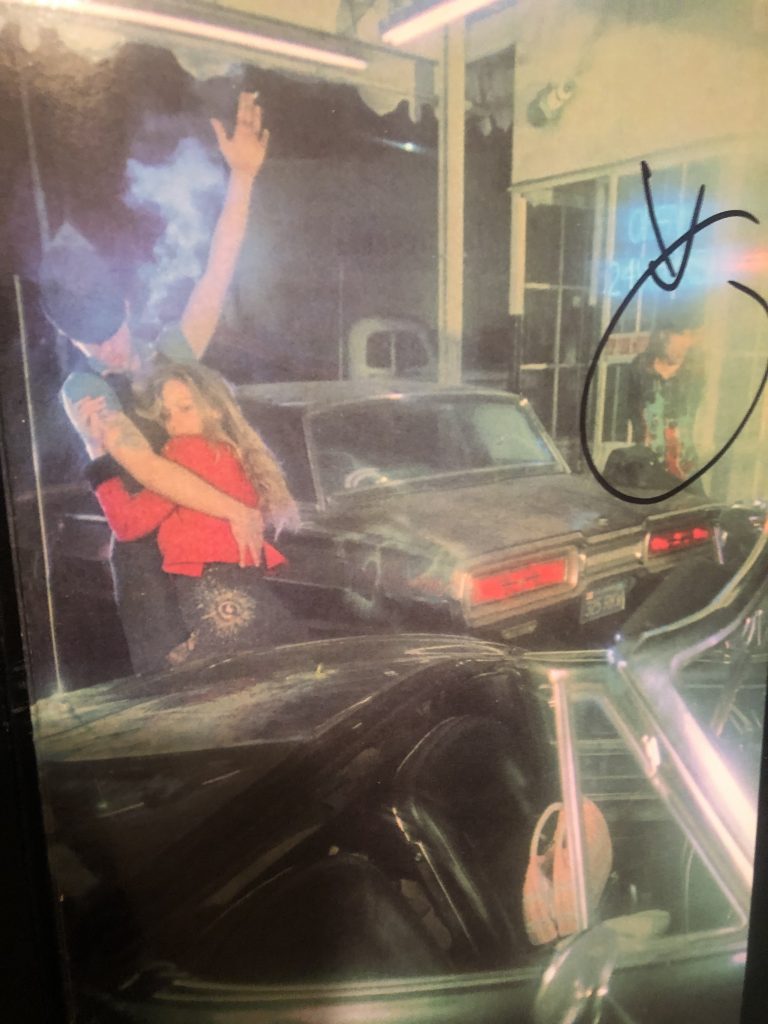
Waits, Rickie Lee, and Chuck E. (circle) from the “Blue Valentine” album.
In 1987 Weiss told me he was uncomfortable with “Chuck E.’s in Love.” He explained, “I thought I was too cool to have a cute little thing like that attached to my name. I had no idea it was going to happen.
“She used to sing the song to me on guitar and I’d laugh. When I first heard it on the radio, I felt kind of happy and kind of embarrassed. Then after that, I was totally embarrassed every time I heard it. I never told her, but she probably knows it.”
In a heartfelt July 23 Los Angeles Times tribute to Weiss, Jones wrote of Waits and Weiss, “….They were two of the most charismatic characters Hollywood had seen in decades and without them, I think the entire street of Santa Monica Boulevard would have collapsed……Chuck was a digger of culture and more than once brought up great nuggets of Black music for Waits to mine. For the white kids lining up outside The Central on Sunset Blvd., this was as close to the Black clubs of Cleveland and Memphis as they were ever gonna’ get.”
In 2002 Waits told the Philadelphia Inquirer, “Chuck E. Weiss is a mensch, a liar, a monkey, and a pathological Vaudevillian. He is a distant relative of Houdini’s, he’s a praying mantis riding an egret through a bad neighborhood. He’s a reverend waving a pistol around. Basically, he’s in the salvage business and you should do everything he tells you.”
Fact or fiction, I was enamored with Weiss’s stories.
He also had a rugged exterior, but I sensed a river of vulnerability. In 1990 I returned to Los Angeles to interview the Chicago blues giant Willie Dixon. I visited The Central and had coffee with Weiss. At this time he said he was “no longer” friends with Waits but that changed.
In 1999 Weiss delivered “Extremely Cool” (Rykodisc), his first album since 1981’s “The Other Side of Town,” a demo tape that was not supposed to be released. Waits sang, played guitar, and co-produced “Extremely Cool.” Waits and his wife Kathleen Brennan are credited as Executive Producers. Brennan is a native of Johnsburg, Il., just outside of McHenry. Brennan and Waits met at a 1980 New Year’s Eve concert headlined by rhythm and blues great Roy “Good Rockin’ Tonight”) Brown in Los Angeles.
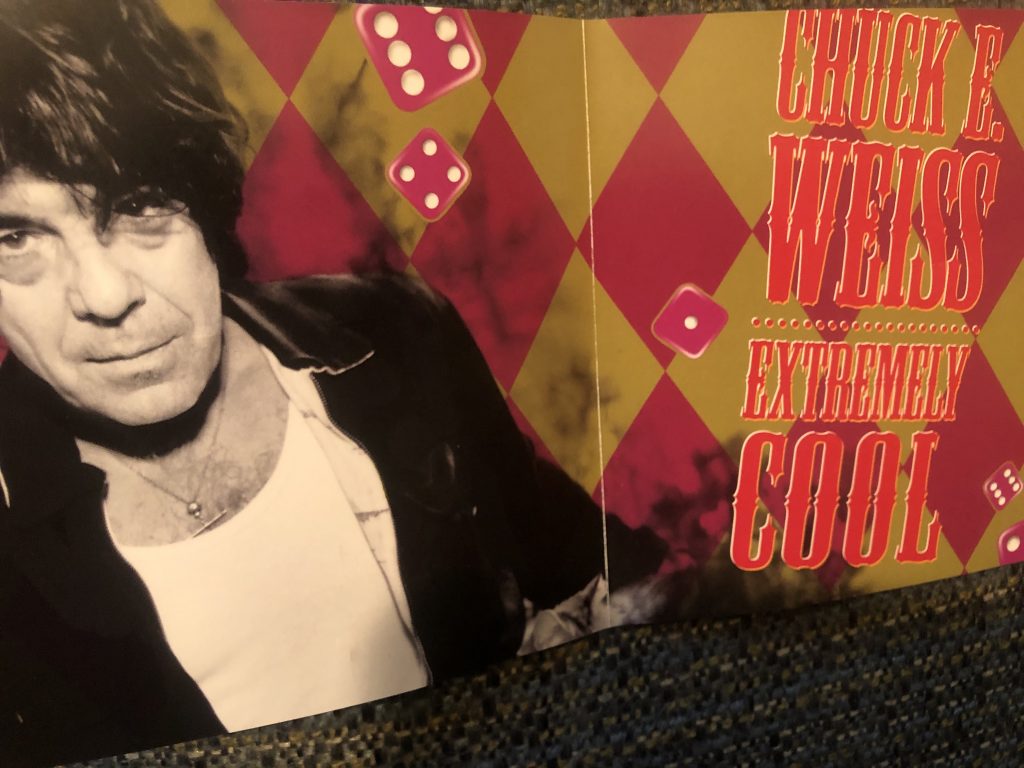
The lead-off track “Devil With Blue Suede Shoes” (produced by Johnny Depp) pays homage to the profound rhythms of Howlin’ Wolf” while “Just Don’t Care” is flavored by Pops Staples influenced tremolo guitar. The title track rolls out into a finger-snapping salute to urban poets like Ken Nordine.
Weiss occasionally gigged with Lightin’ Hopkins and Willie Dixon and Dixon once asked, “Ain’t you got ears son? That little Jew boy with the big old head could be one of the best musicians in this town, this country even.”
Waits and Depp returned as executive producers of 2014’s “Red Beans & Weiss (ANTI-) which was Weiss’s final recording The project leaned more into scat jazz/spoken word although it featured “Dead Man’s Shoes,” a hard boogie which had become a staple of the Liars live sets at The Central. “It’s about a wino Spyder and I knew in my neighborhood,” Weiss told me in 1987. “His name was Papa and the day he died in a parking lot, his shoes mysteriously ended up for sale in the window of a shoe store. Nobody would buy them because everybody knew they were Papas’ shoes. So we bought them for our guitar player as a Christmas present. He was afraid to wear them.”
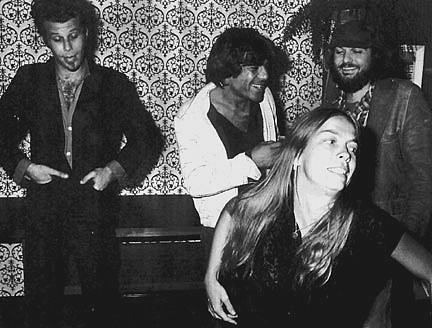
Tom Waits (far left), Weiss, Dr. John, and Rickie Lee; summer of ’79. (Jenny Lens Punk Archive.)
The 2014 song “Tupelo Joe” was about an upright bass sax player but it becomes the intersection of Davie Allan and the Arrows guitars and Carl Perkins rockabilly. The last time we spoke, Weiss was reading lots of poetry. “I hate the word ‘poetry,’ he said. “I write these little poems for these shows and Spyder and I come in sometimes with a bongo player. Some of my stuff is nasty and dirty. I hate the word ‘Americana,’ but some of it is that. The stuff is along the lines of Lord Buckley or jailhouse poetry. But musically our foundation is rock n’ roll and real old-time jump n’ jive.”
Some moments fade through the clouds of time. But the moments where you are liberated by the spirit of music are the ones you never forget. I remember Weiss on that four-foot-high Central stage singing obscure rhythm and blues as if it were yesterday. Every number made sense. Every heart was a new tattoo. In his beautiful, singular way, Chuck E. Weiss dealt the cards and rolled the dice.
And we are the lucky ones.

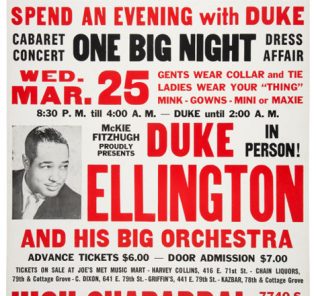


Thanks for the memories great work